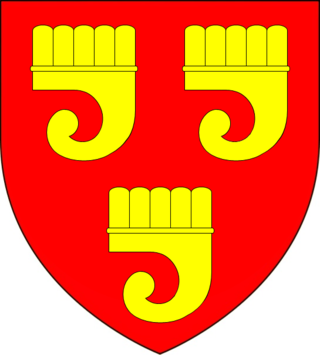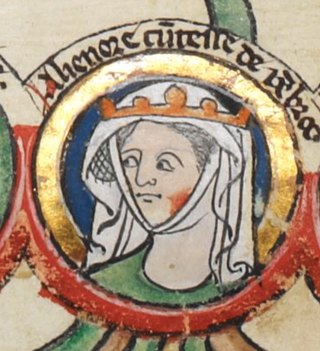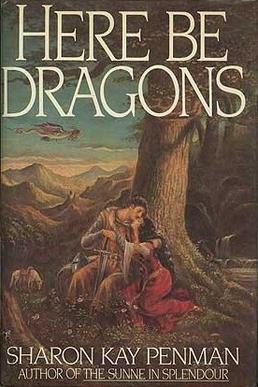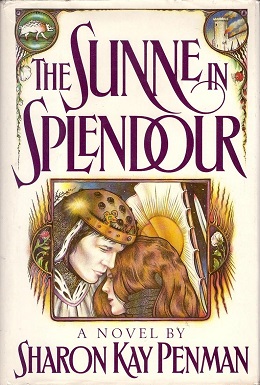
Louis VII, called the Younger, or the Young, was King of the Franks from 1137 to 1180. He was the son and successor of King Louis VI and married Duchess Eleanor of Aquitaine, one of the wealthiest and most powerful women in western Europe. The marriage temporarily extended the Capetian lands to the Pyrenees.

Sharon Kay Penman was an American historical novelist, published in the UK as Sharon Penman. She was best known for the Welsh Princes trilogy and the Plantagenet series. In addition, she wrote four medieval mysteries, the first of which, The Queen's Man, was a finalist in 1996 for the Best First Mystery Edgar Award.

The White Ship was a vessel transporting many nobles, including the heir to the English throne, that sank in the Channel during a trip from France to England near the Normandy coast off Barfleur, on 25 November 1120. Only one of approximately 300 people aboard, a butcher from Rouen, survived.

Cecily Neville was an English noblewoman, the wife of Richard, Duke of York (1411–1460), and the mother of two kings of England—Edward IV and Richard III. Cecily Neville was known as "the Rose of Raby", because she was born at Raby Castle in Durham, and "Proud Cis", because of her pride and a temper that went with it, although she was also known for her piety. She herself signed her name "Cecylle".

Robert FitzRoy, 1st Earl of Gloucester was an illegitimate son of King Henry I of England. He was the half-brother of the Empress Matilda, and her chief military supporter during the civil war known as The Anarchy, in which she vied with Stephen of Blois for the throne of England.
Geoffrey de Mandeville II, 1st Earl of Essex was a prominent figure during the reign of King Stephen of England. His biographer, the 19th-century historian J. H. Round, called him "the most perfect and typical presentment of the feudal and anarchic spirit that stamps the reign of Stephen". That characterisation has been disputed since the later 20th century.
Ranulf is a masculine given name in the English language. It is derived from the Old Norse name Reginúlfr. This Old Norse personal name is composed of two elements: the first, regin, means "advice", "decision" ; the second element, úlfr, means "wolf". Reginúlfr was introduced into Scotland and northern England, by Scandinavian settlers, in the Early Middle Ages.

Eleanor of England was the youngest child of John, King of England and Isabella of Angoulême.

Here Be Dragons is a historical novel written by Sharon Kay Penman published in 1985. The novel is the first in a trilogy known as the Welsh Princes series set in medieval England, Wales and France that feature the Plantagenet kings.
John FitzGilbert, the Marshal of the Horses, was a minor nobleman of supposed Anglo-Norman origin, during the reign of King Stephen, and fought in the 12th-century civil war on the side of Empress Matilda.
King Stephen of England was a grandson of William the Conqueror, and has been depicted in various cultural works. He was King of England from 1135 to his death, and also the Count of Boulogne jure uxoris. His reign was marked by civil war with his cousin and rival the Empress Matilda, in a period called the Anarchy which has been dramatized by Beth Flintoff in her play Matilda the Empress, first performed in November 2017 at St James's Church, Reading. Stephen was succeeded by Matilda's son, Henry II, the first of the Angevin kings.

The Sunne in Splendour is a historical novel written by Sharon Kay Penman. Penman became interested in the subject of Richard III while a student and wrote a manuscript that was stolen from her car. She rewrote the manuscript, which was published in 1982.
Pendragon's Banner is an historical fantasy trilogy by the British author Helen Hollick, published by William Heinemann in 1994, and later by Sourcebooks Inc in 2009 and by SilverWood Books in 2011. The three books are a re-telling of the King Arthur legend. They look to show Arthur Pendragon as he might have really been - no magic, fantasy or medieval legend. This is the basic, post-Roman view of Arthur as a battle-hardened warlord.

The Reckoning is a medieval historical novel written by Sharon Kay Penman published in 1991. The plot is of Wales's Llewelyn ap Gruffydd's fight to keep Wales independent of England and of the love story between the Welsh Prince and Eleanor de Montfort. In her writing, Penman presents the nobility of the period and focuses on conflict on various levels from individual conflicts to wars between countries. The novel received generally good reviews.

Devil's Brood is a historical novel written by Sharon Kay Penman, published in 2008, and is the third volume in her Plantagenet series, preceded by When Christ and His Saints Slept and Time and Chance, and followed by Lionheart (2011).

Time and Chance is a historical novel written by Sharon Kay Penman published in 2002 and is the second volume in the Plantagenet trilogy, preceded by When Christ and His Saints Slept and followed by Devil's Brood.

Dickon is a 1929 novel by Marjorie Bowen about King Richard III of England. It was one of many historical fiction works she wrote in her life.
Cultural depictions of the Anarchy, a long-running civil war in England between 1135 and 1153, has furnished the background of some major fictional portrayals. These include:
The 12th-century ruler Empress Matilda has been depicted in various cultural media.
William Marshal, 1st Earl of Pembroke was an Anglo-Norman soldier and statesman. He served five English kings – Henry II, his sons the "Young King" Henry, Richard I, and John, and John's son Henry III.












